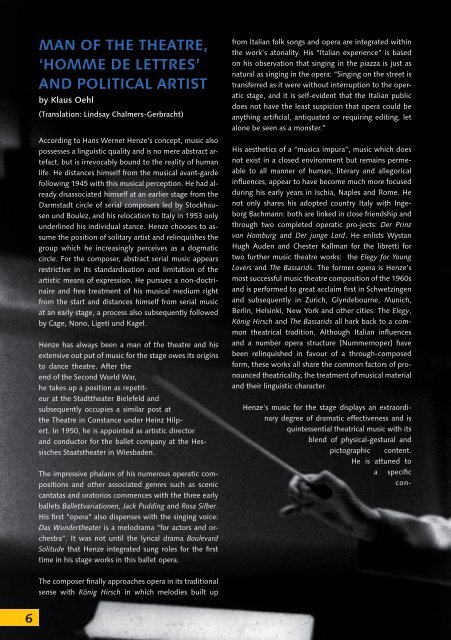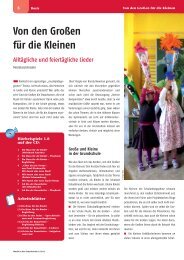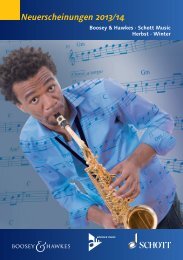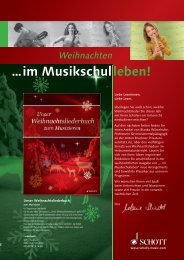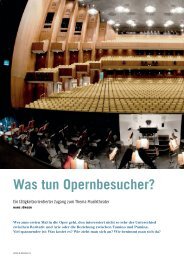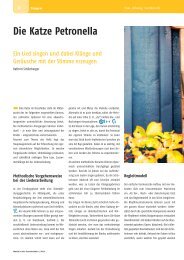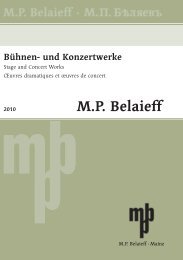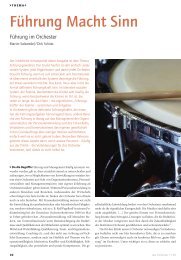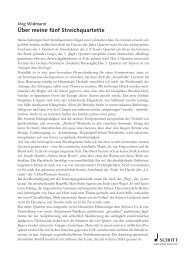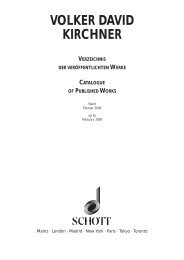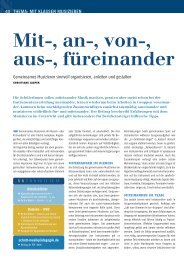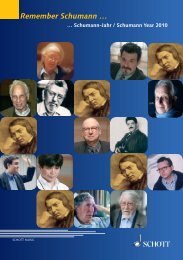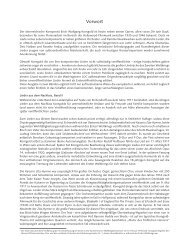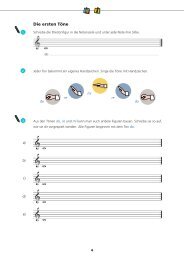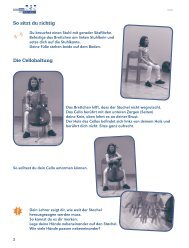HANS WERNER HENZE - Schott Music
HANS WERNER HENZE - Schott Music
HANS WERNER HENZE - Schott Music
Erfolgreiche ePaper selbst erstellen
Machen Sie aus Ihren PDF Publikationen ein blätterbares Flipbook mit unserer einzigartigen Google optimierten e-Paper Software.
6<br />
MAN OF THE THEATRE,<br />
‘HOMME DE LETTRES’<br />
AND POLITICAL ARTIST<br />
by Klaus Oehl<br />
(Translation: Lindsay Chalmers-Gerbracht)<br />
According to Hans Werner Henze’s concept, music also<br />
possesses a linguistic quality and is no mere abstract artefact,<br />
but is irrevocably bound to the reality of human<br />
life. He distances himself from the musical avant-garde<br />
following 1945 with this musical perception. He had already<br />
disassociated himself at an earlier stage from the<br />
Darmstadt circle of serial composers led by Stockhausen<br />
und Boulez, and his relocation to Italy in 1953 only<br />
underlined his individual stance. Henze chooses to assume<br />
the position of solitary artist and relinquishes the<br />
group which he increasingly perceives as a dogmatic<br />
circle. For the composer, abstract serial music appears<br />
restrictive in its standardisation and limitation of the<br />
artistic means of expression. He pursues a non-doctrinaire<br />
and free treatment of his musical medium right<br />
from the start and distances himself from serial music<br />
at an early stage, a process also subsequently followed<br />
by Cage, Nono, Ligeti und Kagel.<br />
Henze has always been a man of the theatre and his<br />
extensive out put of music for the stage owes its origins<br />
to dance theatre. After the<br />
end of the Second World War,<br />
he takes up a position as repetiteur<br />
at the Stadttheater Bielefeld and<br />
subsequently occupies a similar post at<br />
the Theatre in Constance under Heinz Hilpert.<br />
In 1950, he is appointed as artistic director<br />
and conductor for the ballet company at the Hessisches<br />
Staatstheater in Wiesbaden.<br />
The impressive phalanx of his numerous operatic compositions<br />
and other associated genres such as scenic<br />
cantatas and oratorios commences with the three early<br />
ballets Ballettvariationen, Jack Pudding and Rosa Silber.<br />
His first “opera” also dispenses with the singing voice:<br />
Das Wundertheater is a melodrama “for actors and orchestra”.<br />
It was not until the lyrical drama Boulevard<br />
Solitude that Henze integrated sung roles for the first<br />
time in his stage works in this ballet opera.<br />
The composer finally approaches opera in its traditional<br />
sense with König Hirsch in which melodies built up<br />
from Italian folk songs and opera are integrated within<br />
the work’s atonality. His “Italian experience” is based<br />
on his observation that singing in the piazza is just as<br />
natural as singing in the opera: “Singing on the street is<br />
transferred as it were without interruption to the operatic<br />
stage, and it is self-evident that the Italian public<br />
does not have the least suspicion that opera could be<br />
anything artificial, antiquated or requiring editing, let<br />
alone be seen as a monster.”<br />
His aesthetics of a “musica impura”, music which does<br />
not exist in a closed environment but remains permeable<br />
to all manner of human, literary and allegorical<br />
influences, appear to have become much more focused<br />
during his early years in Ischia, Naples and Rome. He<br />
not only shares his adopted country Italy with Ingeborg<br />
Bachmann: both are linked in close friendship and<br />
through two completed operatic pro-jects: Der Prinz<br />
von Homburg and Der junge Lord. He enlists Wystan<br />
Hugh Auden and Chester Kallman for the libretti for<br />
two further music theatre works: the Elegy for Young<br />
Lovers and The Bassarids. The former opera is Henze’s<br />
most successful music theatre composition of the 1960s<br />
and is performed to great acclaim first in Schwetzingen<br />
and subsequently in Zurich, Glyndebourne, Munich,<br />
Berlin, Helsinki, New York and other cities. The Elegy,<br />
König Hirsch and The Bassarids all hark back to a common<br />
theatrical tradition. Although Italian influences<br />
and a number opera structure [Nummernoper] have<br />
been relinquished in favour of a through-composed<br />
form, these works all share the common factors of pronounced<br />
theatricality, the treatment of musical material<br />
and their linguistic character.<br />
Henze’s music for the stage displays an extraordinary<br />
degree of dramatic effectiveness and is<br />
quintessential theatrical music with its<br />
blend of physical-gestural and<br />
pictographic content.<br />
He is attuned to<br />
a specific<br />
con-


